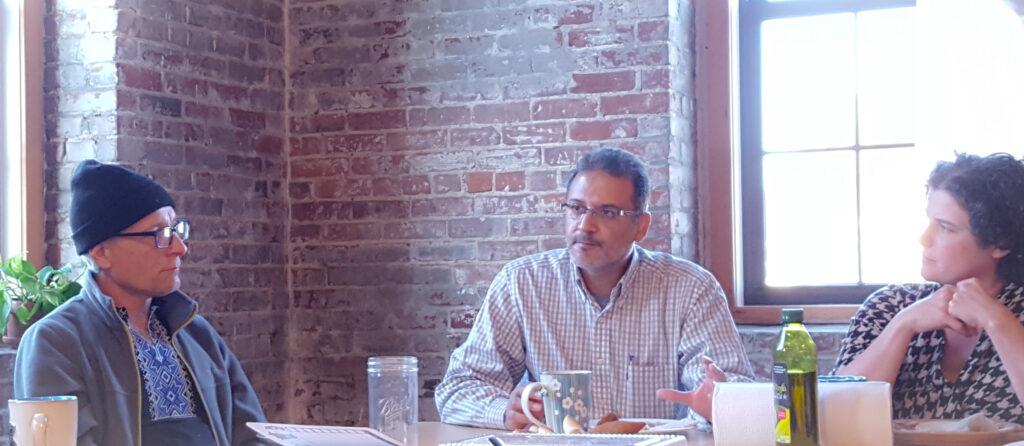Demanding the Human Right to Mental Health in Gaza
December 10th is International Human Rights Day. For 70 years, people have used the Universal Declaration of Human Rights to raise demands for dignified lives, free from violence. But can we have dignified lives without sound mental health? The Gaza Community Mental Health Program (GCMHP), a long-standing Grassroots International partner, says no. Mental health is a crucial part of human rights.
Two weeks ago, amid yet another spate of Israeli airstrikes, GCMHP Executive Director Dr. Yasser Abu Jamei visited Grassroots’ office. We shared lunch as he talked about the situation in Gaza, the ongoing work of GCMHP, and Grassroots’ support.
“We have a proverb, ‘when you’re in hard times, a good friend is there,’” Dr. Abu Jamei told us. “Really, that’s how we feel about Grassroots.”
Occupation Creates a Mental Health Crisis
Those hard times are a persistent feature in Gaza, thanks to the ongoing Israeli occupation and siege.
For decades now, Dr. Abu Jamei and others at GCHMP have heard stories like this one from 2014. As Israeli bombs fell on the Strip that summer, 11-year-old Deena Zurik huddled with their parents, restless. “I am always afraid to sleep alone. The missile shakes the room,” she said.
Mothers like Umm Fadi in Rafah felt helpless amid the bombings as well. “I am afraid myself, and my children come to hide in my bedroom. How can I possibly show them that I am not afraid?” she said. “Even closing the door of the fridge can scare my daughters.”
Israel’s repeated bombings and the suffocating blockade have driven a mental health crisis in Gaza. But GCMHP has met this crisis head on. For the past 28 years, it has been a critical organization in the occupied territory, and it has been a Grassroots International partner and grantee for nearly its entire existence.
“We have defined mental health as basic human rights,” GCMHP founder Dr. Eyad El-Sarraj said in a 2012 interview. “We carried on defending human rights at the same time as we tried serving the community.”
In the months following Israel’s November 2012 bombings on Gaza, the United Nations Relief and Works Agency for Palestine Refugees in the Near East (UNRWA) reported 42 percent of post-traumatic stress disorder (PTSD) patients in Gaza were under the age of nine. The World Health Organization has estimated that 20 percent of Gazans may have developed mental health conditions from Israel’s 2014 assault.
Since then, Gazans have dealt with more persistent stressors — weekly sniper fire near the wall, 20-hour rolling blackouts, lack of water and sanitation, and a 60-percent unemployment rate for 15- to 29-year-olds.

GCMHP Organizes and Heals
In defiance, GCMHP and the community as a whole continue to organize and heal. GCMHP has provided high quality mental health care to adults and children wherever they are — including homes, schools, youth and women’s centers, and clinical settings — and through every crisis.
With funding support from Grassroots International in 2004, GCMHP provided trauma counseling and crisis intervention teams for people in the Gaza Strip during the second intifada. In 2008, Israeli bombs partially destroyed GCMHP’s headquarters during the Cast Lead assault. Grassroots’ funds allowed GCMHP to continue providing critical mental trauma services for the war’s survivors.
Amid rolling power outages during Israel’s 2014 attack, it ran a 24-hour mental health hotline. It now sees nearly 50,000 patients annually and normally adds between 750 and 900 cases each year.
GCMHP has also helped to put mental health front and center as a human rights issue. In 2016, Dr. Abu Jamei travelled to Washington, D.C. to lobby Congress and generate support for mental health services in Gaza. As the founder Dr. Eyad El Sarraj told Grassroots in 2011, GCMHP provides specialized support so the community can heal at the same time it builds a nonviolent resistance movement.
Partnership for Mental Health and Human Rights
Palestinians have remained resilient in the face of oppression; mental health care is an essential component of their human rights, their dignity and their survival. GCMHP is one of our longest-running partnerships in Gaza. On International Human Rights Day, we are honoring this important organization.


